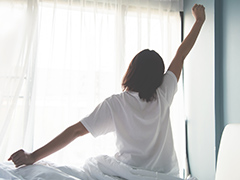Your Internal Clock, Explained

Does it ever feel like some people are better at waking up early than other people? Or that you can only get work done in the mornings? Circadian rhythms may have something to do with it.
Your circadian rhythms, commonly referred to as your internal clock, guide your body when to wake up, when to fall asleep, when to be productive and when to be relaxed. Your brain responds to these rhythms and releases hormones that adjust your energy levels. For most people, their mental alertness is at its highest at 9 a.m. and 9 p.m. Most peoples’ physical strength is at its highest at 11 a.m. and 7 p.m.
When you disrupt these patterns, it can lead to sleep issues like insomnia or exhaustion. We often do this when we change clocks for daylight savings, fly across time zones or don’t stick to a regular sleep schedule.
Researchers have identified sunlight as being responsible for how our internal clocks adjust. If you struggle to go to sleep at night, make sure you dim the lights and avoid any screens. Your brain can mistake the blue light from televisions and other screens as sunlight and make you feel less tired. When you wake up, turn on the lights and get some sunlight to feel more energized.
But is there such a thing as ‘morning people’ and ‘night people?’ Somewhat. Researchers believe it’s caused by your circadian rhythm—not genetics. This means you can get your body used to waking up earlier if you’re a night person, or vice-versa. Researchers have also found that the lifestyles of night people tend to be less healthy than morning people. Night people may be more likely to suffer from heart issues, type 2 diabetes and sleep conditions, while morning people tend to be more physically active and eat better.
If you’re a night person looking to improve your lifestyle, don’t forget to take the Blue Health Assessment. In just 10 minutes, you can answer some simple questions and receive an easy-to-follow, personalized action plan for a healthier you. Eligible Standard and Basic Option members may even earn rewards for completing it.*
*You must be 18 or older and the contract holder or spouse on a Standard or Basic Option plan to earn this reward.


